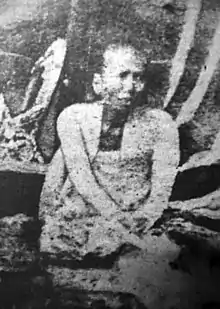Hsinbyumashin
Hsinbyumashin (Burmese: ဆင်ဖြူမရှင်) was a senior queen of King Mindon Min during the Konbaung dynasty. She was born Princess Supayagale c. 1821, the daughter of King Bagyidaw and his consort Nanmadaw Me Nu.[1]
| Hsinbyumashin | |||||
|---|---|---|---|---|---|
 | |||||
| Queen of the Central Palace | |||||
| Tenure | 26 March 1853 - 1 October 1878 | ||||
| Coronation | 1855 | ||||
| Predecessor |
| ||||
| Successor | None | ||||
| Born | 22 November 1821 Amarapura | ||||
| Died | 26 February 1900 (aged 78) Rangoon, British Burma | ||||
| Burial | |||||
| Spouse | King Mindon Min | ||||
| Issue | |||||
| |||||
| House | Konbaung | ||||
| Father | Bagyidaw (Sagaing Min) | ||||
| Mother | Nanmadaw Me Nu | ||||
| Religion | Theravada Buddhism | ||||
She was wedded to Mindon Min, the penultimate king, who made her the high-ranking "Queen of the Central Palace" (အလယ်နန်းမတော်မိဖုရားကြီး).[2] Her full regnal title upon ascending the throne was Sīripavaratiloka Mahārājindādhipati Padumaratanādevī (သီရိပဝရတိလောက မဟာရာဇိန္ဒာဓိပတိ ပဒုမရတနာဒေဝီ). On 25 November 1877, she received the title Hsinbyumashin, which translates to "mistress of the white elephants," upon receiving a white elephant named Sīrimahāsubhatta from King Mindon.[3][4]
Hsinbyumashin dominated the last days of King Mindon. She orchestrated the massacre of upward of 100 members of the royal family, it was an edict by Hsinbyumashin that ordered almost all possible heirs to the throne be killed, so that her daughter Supayalat and son-in-law Thibaw Min would become queen and king.[5] The ambitious Hsinbyumashin, after placing Thibaw on the throne, offered her oldest daughter Supayagyi, to be his queen. During the royal aggamahesi coronation, Supayalat pushed in next to her sister to be anointed queen at the same time, breaking ancient custom. The female lineage of Hsinphyumashin, her mother Nanmadaw Me Nu, and her daughter Supayalat in the male dominated Burmese monarchy is a very interesting one regarding the end of Independence and the monarchy.
Exile
The Konbaung dynasty reign lasted just seven years when Thibaw Min was defeated in the Third Anglo-Burmese War and forced to abdicate by the British in 1885. On 25 November 1885, the royal family were taken away in a covered carriage, leaving Mandalay Palace by the southern gate of the walled city along the streets lined by British soldiers and their wailing subjects, to the River Irrawaddy where a steamboat called Thuriya (Sun) awaited. Hsinbyumashin and her daughter, Supayagyi, were sent to Tavoy (now Dawei).[6] She died in Rangoon, British Burma on 26 February 1900.[7] Her remains were interred at the Mandalay Palace enclosure (see Konbaung tombs).
In popular culture
- The 2017 Thai soap opera Plerng Phra Nang was loosely based on Hsinbyumashin's life.
See also
References
- Shah, Sudha (2012-06-14). The King In Exile : The Fall Of The Royal Family Of Burma. Harper Collins. ISBN 9789350295984.
- Yi, Ma Yi (1965). "Burmese Sources for the History of the Konbaung Period 1752–1885*". Journal of Southeast Asian History. 6 (1): 48–66. doi:10.1017/S0217781100002477. ISSN 0217-7811.
- Latt, Tin Moe (2007). "Myanmar women in the traditional society (1752-1885)". Cite journal requires
|journal=(help) - Tun, Than. "Chronology of Mandalay" (PDF).
- Asaree Thaitrakulpanich (3 March 2017). "THAI SOAP OFFENDS BURMESE WITH ROYAL CARICATURE". Khaosod English.
- "Forty Years in Burma, by John Ebenezer Marks". anglicanhistory.org. Retrieved 2018-10-04.
- Yi, Khin (2018-05-31). The Dobama Movement in Burma (1930–1938). Cornell University Press. ISBN 9781501719547.
Hsinbyumashin | ||
| Royal titles | ||
|---|---|---|
| Preceded by Thiri Ti Lawka Atula Yadana Dewi Thiri Thu Yadana Mingala Dewi |
Queen of the Central Palace of Burma 26 July 1855 - 1 October 1878 |
- |